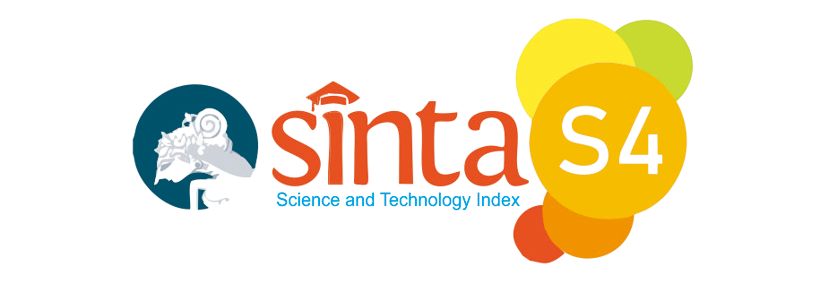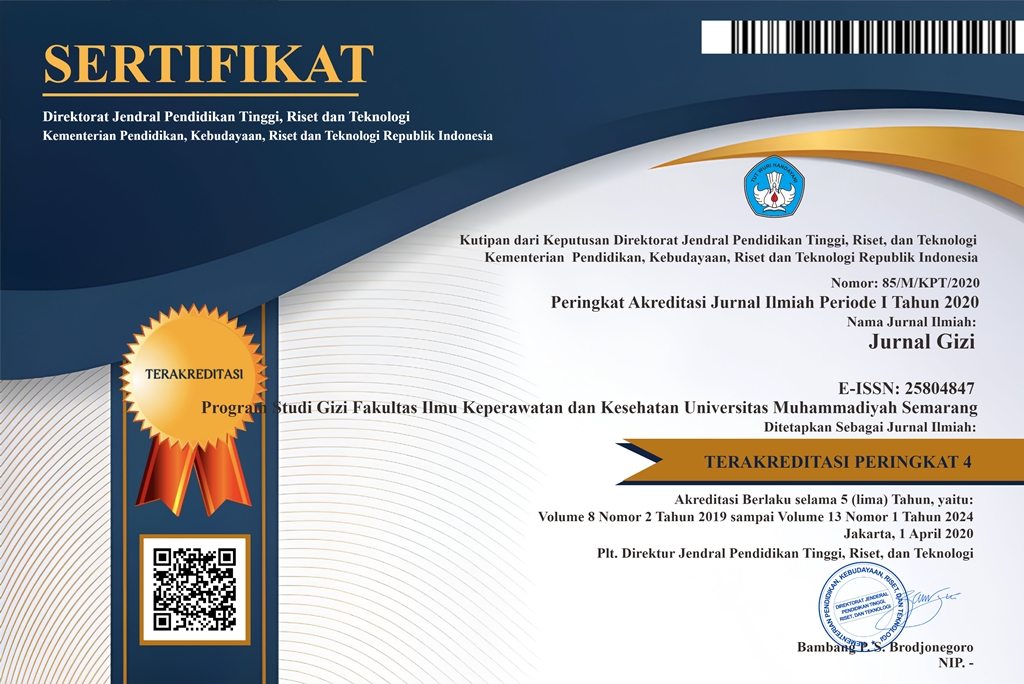Pengaruh Penyuluhan Metode Partisipatif Tentang MPASI Terhadap Praktek Pemberian MPASI Bayi 6-12 Bulan di Wilayah Kerja Puskesmas Brangsong 02 Kendal
(1)
(2)
(3)
(*) Corresponding Author
Abstract
Weaning food (MP-ASI) is a meal or beverage given to 6-24 months old baby/child to fulfill the nutrient requirement. There are still a lot of fault about the giving of weaning food to 6-12 months old baby. Participative elucidation is a modification of other elucidation methods by direct practicing of making the weaning correctly. The aim of this research is to measure the effect of participative elucidation method about weaning food giving practice toward 6-12 months old child.
This research is Pure Experimental Research with Frequent Experiment Program or Pretest-Posttest Control Group Design. Seventhy six responden of 6-12 months child is divided into 2 groups, with 38 responden of each group. The first group
is the target of participative eludication method (treatment group) and the second is the control group. The Mann-Whitneys different test is using to find out the difference of average increase of giving weaning practise score, between the treatment group and the control group.
The increasing of average score of giving weaning practise on the treatment group is higher then the other (control group). The increasing of the average score on the treatment group is 2,39 % 0,755 % and on the control group is 0,29 % 0,515 %.
There is a difference of the increasing of the average score of weaning food giving practice between 6-12 months old babys mothers who is given participative eludication method and who is not (p = 0,000). The treatment group is better in weaning food
giving practice than the control group.
The present of participative eludication method can significantly improve the weaning food giving practice of 6-12 months old childs mother and better then lecture.
Key words: Weaning Food, Participative Counseling, 6-12 months babies mothers.
This research is Pure Experimental Research with Frequent Experiment Program or Pretest-Posttest Control Group Design. Seventhy six responden of 6-12 months child is divided into 2 groups, with 38 responden of each group. The first group
is the target of participative eludication method (treatment group) and the second is the control group. The Mann-Whitneys different test is using to find out the difference of average increase of giving weaning practise score, between the treatment group and the control group.
The increasing of average score of giving weaning practise on the treatment group is higher then the other (control group). The increasing of the average score on the treatment group is 2,39 % 0,755 % and on the control group is 0,29 % 0,515 %.
There is a difference of the increasing of the average score of weaning food giving practice between 6-12 months old babys mothers who is given participative eludication method and who is not (p = 0,000). The treatment group is better in weaning food
giving practice than the control group.
The present of participative eludication method can significantly improve the weaning food giving practice of 6-12 months old childs mother and better then lecture.
Key words: Weaning Food, Participative Counseling, 6-12 months babies mothers.
Full Text:
PDFArticle Metrics
Abstract view : 927 timesPDF - 315 times
DOI: https://doi.org/10.26714/jg.5.2.2016.%25p
Refbacks
- There are currently no refbacks.
Diterbitkan oleh: Program Studi Gizi (D3 dan S1)
Fakultas Ilmu Keperawatan dan Kesehatan
Universitas Muhammadiyah Semarang
Sekretariat: Jl. Kedungmundu Raya No. 18 Semarang
Contact Person : Hapsari Sulistya Kusuma, S.Gz, M.Si (+62 85 6 41 536 553)

This work is licensed under a Creative Commons Attribution 4.0 International License.









.png)
.png)